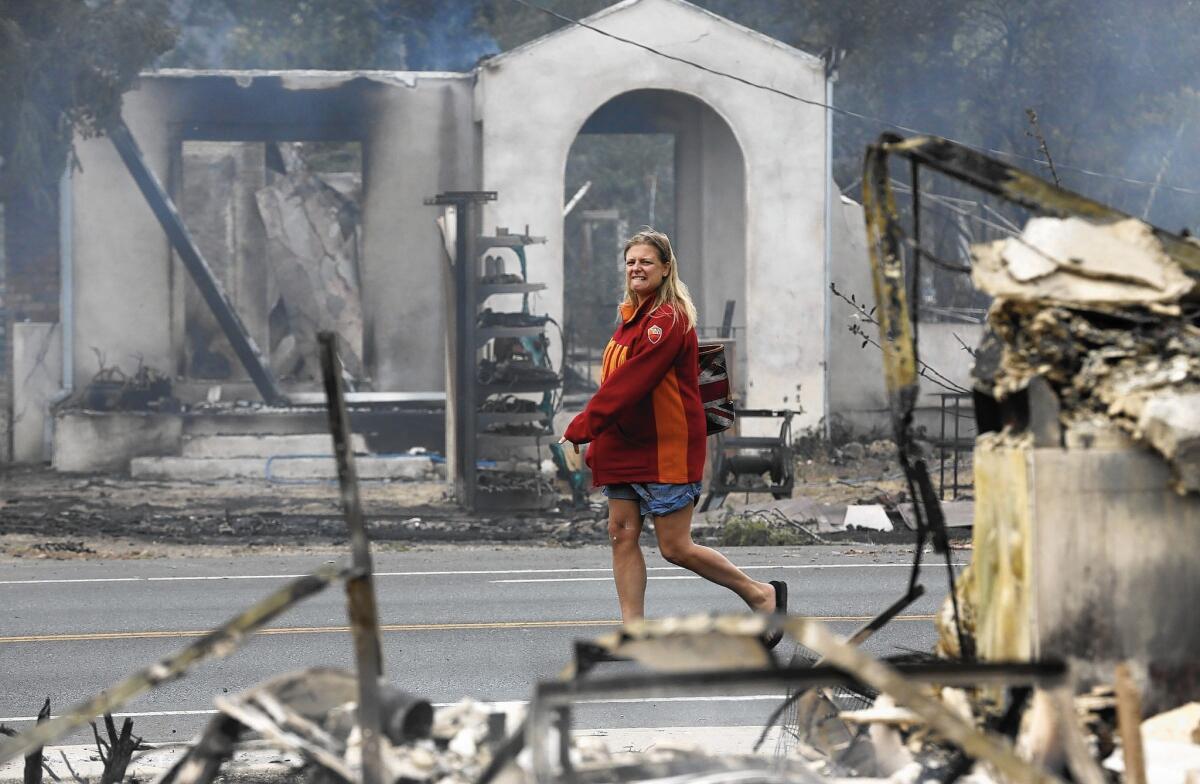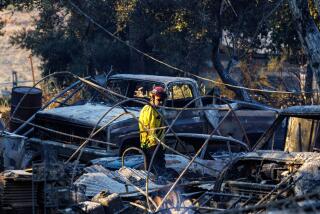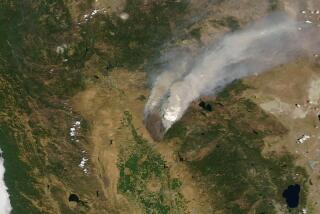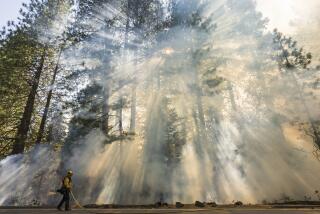Valley fire in Northern California rages as evacuees reflect on what they’ve lost

As the Valley fire in Northern California continued its destructive path Tuesday, nearly 1,000 residents spent the night at the Napa County Fairgrounds under donated blankets and wearing donated clothes.
For some evacuees, the initial sense of relief of surviving the fire gave way to exhaustion, frustration and sadness over the homes, mementos and pets left behind. The massive blaze destroyed nearly 585 homes, forcing thousands of residents to flee.
Cheerleading coach Jill Vierra, 43, of Anderson Springs drove a van full of middle school cheerleaders to Fort Bragg on Saturday morning for a football game. As the squad prepared to take the field, Vierra saw a Facebook notification that wildfires were tearing toward her home.
The blaze swept through hours later, leaving wreckage that resembled a war zone. Her family lost five homes, and she assumes they lost four dogs, two birds and two cats. Only one dog, Zeus, a pit bull, survived.
Her minivan, parked on a field in the fairgrounds complex, still bore the evidence of tween spirit cut short: the moniker “Swaggin’ Wagon” and the names of the Calistoga Colts cheerleading squad scrawled on the windows in white and lavender shoe polish.
“We keep asking ourselves: What do we do?” Vierra said as she sat inside the van, wrapped in a blanket against the mist rising up on the fields. “What do we do if we don’t have anywhere to go?”
Residents who had the time bundled pets into carriers and kennels. Others hoped that police had time to move door to door, kicking doors and gates so dogs, chickens and horses left behind could flee.
“Stuff is just stuff, and it can be replaced—but our dogs…” said David Clark, 32. Flames were leaping from treetop to treetop Saturday afternoon as he got home from his son’s soccer game. They left with nothing, including the dogs. “The not knowing is killing us.”
The Valley fire is one of three major wildfires that continued to burn Tuesday.
But firefighters made progress due to cooler temperatures, light rain and increased humidity, CalFire spokesman Daniel Berlant said. “We can’t become complacent though,” he said, adding that the fires could still grow.
Gov. Jerry Brown warned the previous day that, given the ravages of drought and the growing influence of climate change, “there is more to come.”
California fire updates: The latest on the Valley and Butte blazes >>
By comparison, the similarly sized Butte fire to the east in the Sierra Nevada had nearly 4,600 personnel on it Tuesday morning, including 505 fire engines.
“We have multiple fires, so we’re all stretched thin,” said CalFire’s incident commander for the Valley fire, Robert Michael. “We’re starting to get resources reassigned as each fire is starting to get their containment up.... So we all started short, meaning we’re just stretched.”
Michael said it is not fair to compare the number of crews, trucks and helicopters sent to different fires.
“I don’t know why you need to compare. Each incident is different. They are all equally important,” Michael said. “They lost structures on the Butte fire, they lost structures here.
“They do prioritize incidents but right now because they’re all losing structures, they’re all having extreme fire behavior, they’re all probably equal.”
How the state allocates its fire assets is not just a matter of how many fires, but which ones started first, and “the resources that were assigned initially,” he said.
Michael struggled with the question of why more resources were not being diverted to the Valley fire, with 9,000 homes threatened. The Butte fire, which remains only 37% contained, has 6,400 threatened structures.
“If we have 20 houses burning and we pulled all of the resources off and sent them to another fire that had 100 houses that were threatened, would you as a private citizen appreciate that?” he said.
By the start of Tuesday, 2,300 personnel had joined the effort, including 15 helicopters, a CalFire spokesman said.
Large planes with fire retardant had not worked the Valley fire since its start Saturday. They are expected to join the fray Tuesday, as cloud cover lifted.
“We’ve seen a favorable change in the weather so we’ll be able to engage more aggressively with our air resources today,” said CalFire information officer Mike Smith. “All of our air resources will be dropping water and fire retardant on the lines.”
However, he said, “the vast majority of the perimeter of this fire remains very dangerous.”
In hilly and rural Lake County, a short drive north of the state’s storied wine country, the ferocity and breakaway speed of the Valley fire stunned veteran firefighters, hampered strategic planning and gave rise to worries that it could be a harbinger of an extended, and unpredictable, fire season in the months ahead.
See the most-read stories this hour >>
As of Tuesday morning, the still-raging fire had grown to 67,000 acres.
“We had a good day yesterday. We saved three of the four houses we were tasked to defend,” said Adam Fisher, an engineer with the Larkspur Fire Department, who spent Monday in the Butte Valley area.
Fisher said there are not enough fire engines. His crew was pulled from three community fire departments in Marin County, reflective of the scramble that took place when the fire erupted Saturday. He himself left his family camp outing to celebrate the birthdays of his children.
“The fuels are crazy dry ... but then we are in uncharted territory,” Fisher said.
Also on Tuesday, the Obama administration said it had directed $250 million toward fighting the wildfires raging in California and elsewhere, in addition to $450 million already transferred from different parts of the federal budget earlier this year to go toward fighting such disasters.
The Obama administration called on Congress to start treating the ravenous blazes just like hurricanes, tornadoes and other disasters -- as emergencies exempt from spending limits.
At the Valley fire, authorities Monday confirmed the death of a woman inside her home. Sheriff’s deputies had found her remains in a charred residence on Cobb Mountain the night before. Officials said there were other individuals unaccounted for.
A seven-mile stretch of Highway 175 connecting Cobb, where the fire originated, to the devastated town of Middletown was a corridor of destruction: blackened, abandoned cars, denuded pine groves, dead animals, gutted houses.
“An extraordinarily hostile fire,” said veteran firefighter Kevin Rosado, who was working near the highway Monday.
Two hundred miles to the east, in the Sierra foothill Gold Country, the 71,660-acre Butte fire by Tuesday morning had destroyed 166 homes and 116 outbuildings in Amador and Calaveras counties.
Light rain allowed crews to carve out containment lines around a third of the fire, which has placed thousands of residences in peril.
To the south, the Rough fire, the largest fire in California this year, is burning in the Sequoia and Sierra national forests. The blaze was reported to be 40% contained, but it already has devoured 139,133 acres.
“These are serious fires,” Brown said Monday at the State Office of Emergency Services. “People have been killed. Hundreds of structures have been destroyed. There is more to come.”
CalFire Director Ken Pimlott, who joined Brown at a news conference, said the state already has experienced 6,000 fires this year — 1,500 more than last year. And, he added, “we don’t see an end to fire season for months to come.”
As he has previously done this fire season, Brown anecdotally drew a link between the volatility and frequency of recent wildfires to climate change.
“The fires are acting more aggressively, more unpredictably,” he said. “It’s scary stuff…. We are really in a battle with Mother Nature, and nature is more powerful than we are.”
Later in the day, the governor authorized $12.4 million in additional spending to help fight the Lake County and Gold Country fires — and the additional blazes he said were sure to come.
Early morning fog and a thick layer of smoke hugging the rugged terrain Tuesday is expected to delay liftoff for some dozen helicopters waiting outside Lakeport to aid those crews on the ground.
Times staff writers Veronica Rocha and Joseph Serna in Los Angeles, Lee Romney and Louis Sahagun in Northern California and Christi Parsons in Washington, D.C., contributed to this report.
MORE ON CALIFORNIA WILDFIRES:
Fire in Northern California continues to grow, killing 1 and displacing 13,000
Disabled woman killed in California wildfire could not get out of remote house
In candid online forum, firefighters chronicle Valley fire’s wrath
More to Read
Sign up for Essential California
The most important California stories and recommendations in your inbox every morning.
You may occasionally receive promotional content from the Los Angeles Times.












